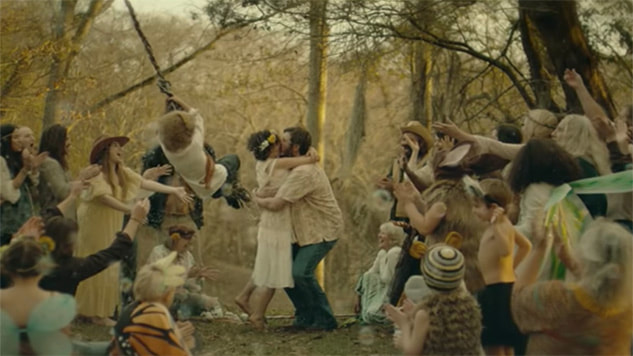It’s hard to be a legend when one is still alive, and the film quickly reveals that the real life Foley won’t be making a cameo appearance. The film is framed by a radio interview between an unseen Hawke and Van Zandt’s Charlie Sexton and Hamilton’s Zee. Hawke’s interviewer, an otherwise knowledgeable study of country and blues, has never heard of Foley, and Sexton and Zee take it upon themselves to educate him. The film then tracks Foley’s relationship with Sybil, who co-wrote the film with Hawke and injects a dose of honesty and realism, his meager successes, and his early death at 39. Each anecdote is treated not as a stop on a predestined path, but as a languid moment not especially different from any other. The film focuses on character rather than a timeline, a refreshing change of pace from something like Bohemian Rhapsody, a disaster that teaches the viewer the order of songs Queen composed but little of the band members themselves.
Blaze paints as complete a picture of its protagonist as two hours of cinema can. A large man, Foley used his girth gently and tenderly, though he knew how much of an ogre he could be if looming was appropriate for the situation. He’s arrogant in that he wants people to listen to his songs and give him their full attention, but he’s tragically uncommercial because he intersperses his songs with long discursions about his observations and his philosophy. He wants to entertain people even in small conversations, away from the slight self-aggrandizement of his stage persona, so he’s quick with a joke or a bon motte. He’s loyal past the point of self-preservation, self-destructive in how easily he can find fault with a paying arrangement, and disdainful towards people who poseur cowboys. Dickey, so unknown as to carry no preconceptions towards his performance, physically embodies the role down to his stride and his drawl, a slurred, thick-tongued cadence that occasionally mangles lines though the emotion behind them never gets lost.
Hawke puts Foley and the other characters in beautifully evocative settings and sequences, none moreso than the backwoods idyll that characterizes Blaze’s and Sybil’s first months together. He and production designer Thomas Hayek construct an Eden to be frolicked in, a vision of perfection better suited to Terence Malick by way of Richard Linklater, such that verbose and perceptive characters are shot in perfect natural light. Surrounded by friends and with enough of piecemeal income to sustain their lives indefinitely, they leave out of an indescribable feeling of incompleteness. Sybil’s an aspiring actress and she’ll never progress beyond the local community theater, while Blaze wants more people to hear his music. They both promise to some day get back here, forgetting that they’re there now, and so they leave because something tells them they’re supposed to. Hawke creates such a sense of place that one can taste the PBR and smell the bonfire, an imparted sense memory that only makes the characters’ inability to return to it all the more affecting.
The film isn’t content to peak early, packed as it is with other stunners. Kris Kristofferson, playing Foley’s formerly violent and presently senile father, almost walks away with the film after only a couple of reaction shots and four words. During a Foley family reunion in dad’s nursing home, Kirstofferson wonderfully portrays a man trapped inside a decaying shell, mostly gone but still reachable with the right combination of words or notes. Shawkat and Dickey’s chemistry persists past their old cabin in a gasp-inducing moment when Blaze returns from a road trip to find her in their apartment, lit by candlelight and giddy with excitement at their reunion. Even scenes as simple as Townes and Zee speaking about Blaze are given weight by and nuance by the distinctions of their recollections. Townes fancies himself the keeper of Blaze’s legacy, but Zee, who spent more time with him, has the occasional, bashful correction, thus making Townes a person basking in reflected glory and Zee someone who prefers the person of Blaze to the legend, both of which the viewer gets to see in action.
Hawke is on an exceptional level with Blaze, a twofer with First Reformed that might mean that he won 2018. By working with Rosen, he ensures that the film will ring of truth, which it sure seems like it does. Hawke immortalizes Foley with this loving portrait of a man who is seen, warts and all, and Hawke continues to guarantee his own immortalization with projects like this one. He’s a filmmaker and an actor who can have the year that he just had, and a fan of his can know that he’ll soon top it, and top it again. If that means slumming it in a car chase flick or some serial killer nonsense, then that’s what it means. A-

 RSS Feed
RSS Feed